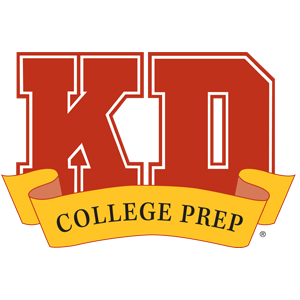It’s that time of year again—time to start off another school year! While a new outfit or set of school supplies can definitely help get you off to a good start, so can a fresh perspective. That’s why our team came up with these 15 back to school tips to help you make this your year.
August is a great time for students to evaluate their performance from the previous year, explore new ways to overcome challenges, and come up with a plan that will help them stay on track for their goals.
We know it’s not easy being a middle school or high school student. There are so many responsibilities, and many students lack the life experience necessary to really know what works best for them in terms of studying, getting involved, or preparing for college admissions. Read on for our advice on how to start the school year off right.
15 Back to School Tips for the 2023-2024 School Year
1. Stay Ahead as Long as You Can
While starting new classes, remember that your outlook about this school year can impact your performance all year long.
It’s a lot easier to earn an A if you do your best from the start instead of falling behind during the first few weeks and having to play catch up the rest of the semester.
Mentally prepare yourself to put your best foot forward in the first half of the semester. Try to stay ahead as long as you can. You may be surprised by how far you’ll go.
2. Create a Daily Routine and Stick to It
Put a finger down if you’ve ever woken up less than 15 minutes before heading out the door, leaving little to no time for getting ready, gathering your things, or eating breakfast. Put another finger down if you’ve ever been tardy.
We get it. Sometimes the alarm doesn’t go off. But have you ever noticed that the anxiety that stems from being late or forgetting your homework can derail your entire day?
Developing a daily routine will keep you feeling refreshed and focused as you tackle your course load throughout the day. This routine will vary depending on your grade level, school, extracurriculars, and any other commitments you have throughout the day (such as a part-time job).
A few general tips for creating a daily routine:
- Set a designated time to wake up, get dressed, and eat breakfast.
- Follow your class schedule during the day, attending every class and activity.
- Remain committed to your extracurriculars, but understand that there are limitations to what you can realistically take on in one day.
- Try not to overload yourself, and communicate with your coach or program director if there are conflicts.
- Plan time in the evening to work on homework, projects, test prep, or college applications.
- Set a designated bed time to ensure you get plenty of sleep each night.
This may seem like common sense, but developing a routine that works for you really is an art! It may take some time to get into the groove, but adding a little structure to your day can help.
3. Make a To-Do List
We recommend setting a list of goals for each day, month, and year. This to-do list may include homework, chores, healthy habits, test prep, creative projects, goals, or other items you plan to accomplish during a specific time frame.
Research shows that when you write your goals down, you are 42 percent more likely to accomplish them. Start small by writing down your plans for each day, and see if it helps boost your productivity.
Some of our students have found success in using the Bullet Journal method to develop their school planners. The Bullet Journal is a creative notebook organization system designed to help you stay on track and better measure your daily successes. It’s also a lot of fun!
4. Keep Track of More Than Just Homework Deadlines
As a high school student, you have a lot on your mind. That’s why we recommend that you write down your deadlines all in one place.
In addition to homework due dates, your school planner should include your test prep schedule, upcoming test dates, extracurricular activities, and scholarship and college application deadlines (if you’re a senior). Try writing things down, and if that doesn’t work for you, explore free digital planning tools like Google Calendar, Apple Calendar, Trello, or other popular tools.
5. Create a Comfortable, Distraction-Free Study Space
Rummaging through a cluttered desk or overhearing your family members talking can easily break your focus. Find a quiet, clean space within your home to sit while studying or working on homework.
If complete silence is hard to find, use headphones to drown out any background noise.
If you lose focus easily, keep all distractions “out of sight and out of mind.” This may involve placing your gaming console in a drawer, keeping pets in another room, or temporarily shutting off notifications for social media apps.
Another tip is to make sure you are comfortable. Avoid sitting on the couch or in bed as this may cause you to become sleepy or hold your body in uncomfortable and awkward positions.
We recommend sitting at a desk or your kitchen table. Grab a comfortable chair that provides adequate back and neck support to avoid discomfort.
If all else fails and you can’t focus in your room, explore other options. Coffee shops, libraries, and empty fast food restaurants with free WiFi can also serve as study spaces.
6. Communicate Your Schedule with Family and Friends
Spending time and making memories with your people is important, especially since the high school years go by so fast! But it shouldn’t take away from time spent working toward your college goals. Most of the time, your loved ones will understand if you have to focus on your homework before you can hang out.
We recommend sharing your schedule with your friends and family. They can help plan around your priorities and support you when you’re overloaded with tasks. However, it helps to be considerate—your parents are busy too! Keep them happy by learning how to prioritize needs at home alongside your school schedule. Try looking at it this way: good time management is an important life skill that you will need in college.
7. Take Breaks
For some students, studying does not come easy. Sometimes we lack focus, even when we carve time out of our day for it. If this sounds like you, try to trick your mind by pairing this not-so-fun task with something you enjoy.
For every hour or so that you spend working on a task, give yourself a little break to do things you love. For example, if you spend an hour studying for an upcoming math test, give yourself a pat on the back by enjoying your favorite snack, taking a short walk, or watching an episode of your favorite show.
Breaking up your study time will prevent brain drain and help you avoid procrastination. But for this to work properly you have to be intentional with managing your breaks and making sure the task merits the reward. For instance, one hour of studying shouldn’t result in four hours of TV.
8. Stay Engaged by Participating and Asking Questions
When attending classes day-in and day-out, it can be challenging to stay engaged. Physically writing your notes can help you follow along and stay alert throughout class. And don’t be afraid to speak up! Answering your teacher’s questions will help you retain what you’re learning, help you identify areas you need to spend more time on, and help your teacher and classmates remember you.
It’s a lot easier to get an extension on a research paper or find partners for group projects if you’ve been present and participated throughout the class. Keep in mind, the more interactions you’ve had with a teacher, the more likely they’ll be willing to write you a letter of recommendation for your college applications.
9. Ask for Help
Another benefit of getting to know your teachers is that you can go to them when you have trouble understanding a concept or need more direction on a school project or essay. If you’re struggling, don’t be afraid to ask for help! If you can’t catch them after class, send an email, go see them before or after school, or schedule a time for you to work on a problem one-on-one.
Remember, the sooner you ask for help, the better. If you can recognize that you’re starting to fall behind early on in the semester, there’s a better chance of getting caught up before the midterms or finals.
Your teachers are experts in the subject and are there to support you throughout your learning. Often they’ll have a better grasp on the content than a parent who hasn’t touched trigonometry or calculus in over 20 years (but let’s give a shoutout to all the amazing moms and dads out there trying to brush up on complex subjects in an effort to help—we know it’s tough not always having the answers).
10. Try to Socialize Every Day
A high school education should extend beyond academics. Knowing how to socialize and interact with others is an important skill that many colleges and employers look for in applicants.
Remember to make the effort to communicate with your friends on a regular basis or look for ways to make new friends. School clubs are a great place to start!
11. Stay Involved
You probably already know that how you spend your time outside of school is an important component of your college application.
Many sports and student organizations like debate or drama club look for new participants each year. Our best advice here is to not be afraid to try something new! However, be mindful of your ability to juggle multiple commitments. It’s okay to try lots of new extracurriculars your freshman year of high school. Remember that as your courses become more challenging, the time will come to decide which ones you like best.
12. Plan Ahead for the SAT®, ACT®, or PSAT Tests
While some colleges will not require a test score when submitting college applications for general admission, the vast majority will still look at them when reviewing college applications.
Colleges may still require test scores for many of the more selective aspects of the college admissions process, such as scholarships, in-state tuition, honors college placement, or admission to a competitive degree program. Keep in mind that some colleges, like MIT and Georgetown, have returned to requiring test scores.
Since test scores will still play a major role in college admissions this year, it’s important to plan ahead when registering for upcoming tests. At KD, we offer test prep courses for the PSAT, SAT®, and ACT® tests to help students reach their college goals.
13. Use Your Time Wisely
As we already mentioned, time management is an important life skill that has an impact on high school and college performance. During these formative years, small acts like learning how to show up on time or planning ahead so you can follow through with your commitments will give the discipline necessary to achieve goals throughout your life.
Productivity can also happen in your free time. Learning a new skill, practicing a dance routine, exercising, working on arts and crafts, or taking a free online course are all productive ways to spend a weekend afternoon. Small activities like these can also help you find peace and positivity.
14. Find Healthy Ways to Manage Stress
The high school years are stressful. In a 2014 study by the American Psychological Association, teens on average reported that their stress level during the school year far exceeds what they believe to be healthy. In 2020, the same organization reported that nearly half of teenagers said that COVID-19 made them feel like it’s impossible to plan for the future.
If you’re experiencing high levels of stress, maybe it’s time to step back, take a deep breath, and evaluate how you feel.
We all strive to be happy, but sometimes that goal remains just outside our grasp. For tips on how to better manage stress, check out our post “How to Be Happy Anywhere (Even School),” written by a former KD student.
Sometimes stress becomes more than we can handle on our own. There’s no shame in seeking help. If you are in need of help and don’t know where else to go, start by taking advantage of these free mental health resources for teenagers.
15. Explore Potential Majors and Career Paths
It seems unfair to force students to decide what they’ll do for the rest of their lives when there’s still so much left to learn about the world. However, the college and job system tends to reward students who have matured enough to make this decision at 17 or 18 years old. For example, competitive degree programs and career-specific scholarships want to know that you’ve decided on a college major.
This choice becomes easier if you’ve dedicated time to trying new things and pursuing particular interests in middle school and high school. Some students know from a young age. Others need to find inspiration through extracurriculars, contests, or a passionate teacher who has a contagious appreciation for a particular subject.
On a final note, we’ll let you in on a little secret: your major or career choice won’t be the only thing that defines you. While many jobs will require a college degree in certain fields, there may come a point in life when you decide to diverge from the traditional path for your chosen major or career. Notable people like Bill Gates, Steve Jobs, Oprah Winfrey, and Howard Schultz (Starbucks CEO) strayed from the traditional path, and they’ve done pretty well. Simply put, your life is what you make it.
Need help preparing for college?
Back to school tips are a great starting point for getting on track, but sometimes students need a little more help. We offer a wide range of test prep and college counseling services to help you make the right choices when preparing for college. Contact a campus near you to get started.































